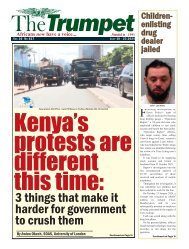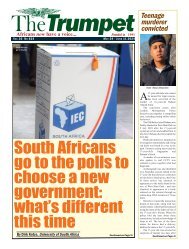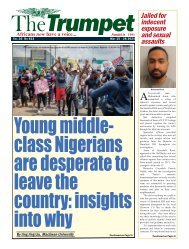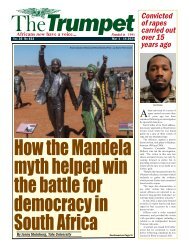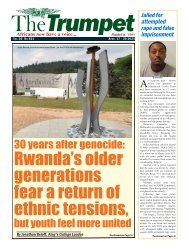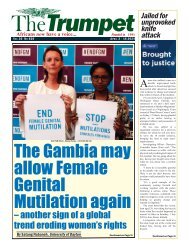The Trumpet Newspaper Issue 625 (June 12 - 25 2024)
Inside Egypt's secret scheme to detain and deport thousands of Sudanese refugees
Inside Egypt's secret scheme to detain and deport thousands of Sudanese refugees
You also want an ePaper? Increase the reach of your titles
YUMPU automatically turns print PDFs into web optimized ePapers that Google loves.
Page14 <strong>The</strong><strong>Trumpet</strong> JUNE <strong>12</strong> - <strong>25</strong> <strong>2024</strong><br />
News<br />
Inside Egypt's secret scheme<br />
to detain and deport thousands<br />
of Sudanese refugees<br />
Continued from Page 6<<br />
investigations conducted by police,<br />
border guards, the Mabahith secret<br />
police agency, and the Department of<br />
Combating Illegal Migration and<br />
Human Trafficking; and decisions taken<br />
by public prosecutors.<br />
In the investigation documents,<br />
refugees are often accused of being part<br />
of smuggling groups or are labelled as<br />
“suspected outlaws” responsible for<br />
“causing serious harm to the dignity and<br />
reputation of Egypt”. <strong>The</strong> language and<br />
allegations are identical in several<br />
different documents, which local<br />
lawyers said indicates that the charges<br />
are premeditated.<br />
Many of the refugees were brought<br />
in front of a public prosecutor, yet guilty<br />
verdicts appear to be rare: In 34 cases<br />
where reporters obtained documents<br />
detailing public prosecutor decisions,<br />
the proceedings all ended with<br />
prosecutor statements calling for the<br />
release of the accused because of a lack<br />
of evidence.<br />
Following the release decisions,<br />
refugees are handed over to security<br />
agencies, according to lawyers and<br />
refugee testimonies. <strong>The</strong>y then have<br />
deportation orders processed against<br />
them anyway, raising questions as to<br />
why they are being put through the<br />
proceedings in the first place.<br />
Throughout the process, refugees are<br />
consistently denied legal defence and<br />
the chance to initiate asylum procedures,<br />
said Mahmoud, the 31-year-old from<br />
Khartoum. He said he was detained in<br />
mid-January and accused by secret<br />
police of smuggling offences.<br />
“We’ve endured injustice and false<br />
accusations without the opportunity to<br />
defend ourselves or contact a lawyer,”<br />
Mahmoud told reporters. “This is<br />
despite authorities being aware of the<br />
perilous journey we have undertaken in<br />
pursuit of asylum in Egypt.”<br />
Since his deportation, Mahmoud said<br />
he has been “tormented” by the question<br />
of why refugees fleeing a war zone are<br />
being punished. Still, he said he<br />
considers himself fortunate to have<br />
survived, given that others endured<br />
“even harsher experiences along the<br />
same journey”.<br />
Rodents, sewage, and stifling heat<br />
Reporters identified six of the main<br />
military bases where refugees are being<br />
detained. Some former detainees<br />
provided coordinates of the facilities,<br />
while in other cases reporters matched<br />
Google Earth and Maxar satellite images<br />
with open source photographs and<br />
videos of the sites, and with verbal<br />
descriptions from refugees.<br />
<strong>The</strong> facilities verified are all in<br />
military-controlled bases in the southern<br />
Aswan and Red Sea governorates. Five<br />
are operated by border guard forces<br />
under the control of the Ministry of<br />
Defence, and one is operated by a police<br />
unit under the Ministry of Interior.<br />
None of the bases are designated as<br />
official detention centres by the Ministry<br />
of Interior, which is a legal requirement,<br />
according to three local lawyers who<br />
asked not to be named because of the<br />
risk of reprisals. <strong>The</strong>y said the detentions<br />
are therefore illegal under Egyptian law.<br />
Satellite images for four of the<br />
facilities show pick-up vehicles of the<br />
kind that refugees said are used by<br />
smugglers. In one facility, over 200 cars<br />
are visible, while in pictures of another<br />
– taken in December and March – the<br />
number of cars increases. <strong>The</strong> images<br />
support the conclusion that the facilities<br />
are housing refugees and that border<br />
guards are engaged in large-scale antirefugee<br />
and anti-smuggling operations.<br />
All the former detainees said they<br />
were denied access to lawyers and<br />
UNHCR workers, and that security<br />
forces requested their phones, though<br />
some were able to hide them. Only one<br />
said they were able to speak to relatives<br />
during their detention period.<br />
Videos, photographs, and refugee<br />
testimonies reveal harrowing conditions<br />
inside the bases, which <strong>The</strong> New<br />
Humanitarian and the Refugees<br />
Platform are identifying in order to<br />
provide information that could be useful<br />
for the relatives of missing refugees.<br />
Nasifa, the refugee deported in<br />
January, stayed in a place that reporters<br />
verified as the Aswan border guard base.<br />
She said refugees were held in a part of<br />
the facility that looked like “a horse<br />
stable”, and that space was so cramped<br />
that new arrivals were put out in a cold<br />
courtyard. Among the detained refugees<br />
was a woman suffering from bleeding,<br />
another with high blood pressure, and a<br />
man with throat cancer, Nasifa said.<br />
Amina, the refugee involved in the<br />
car crash, said she stayed in a “very bad”<br />
facility verified by reporters as the Abu<br />
Ramad military base. Amina said there<br />
was no light, insufficient water, and a<br />
bathroom without a door. She said she<br />
asked for diabetes medication from<br />
soldiers but was not given any during<br />
her detention.<br />
Three refugees said they stayed<br />
inside a facility that reporters verified as<br />
the al-Shallal base, which is managed by<br />
a police unit known as the Central<br />
Security Forces. <strong>The</strong>y said the base is<br />
being used for refugees detained outside<br />
of border areas, and that brief family<br />
visits were occasionally allowed.<br />
Mahmoud, the refugee accused of<br />
smuggling, said he stayed in al-Shallal<br />
for 70 days. He said hundreds of people<br />
were packed into small spaces, and that<br />
many were suffering from respiratory<br />
infections and skin diseases due to<br />
outbreaks of lice and ticks. “It is like a<br />
grave,” Mahmoud said. “<strong>The</strong> lack of<br />
sunlight, coupled with the closed doors,<br />
created an environment conducive to the<br />
spread of diseases.”<br />
Another facility identified and<br />
geolocated by reporters is Abu Simbel<br />
military base. Former detainees,<br />
lawyers, and local government officials<br />
said refugees are transferred to the base<br />
from other military camps ahead of them<br />
being deported through the nearby<br />
Ashkit border crossing.<br />
Nasifa said she was transferred to<br />
Abu Simbel from the Aswan border<br />
guard base. She described<br />
overcrowding, sewage overflowing in<br />
front of a kitchen, and women and<br />
children with food poisoning. She said a<br />
pregnant woman in labour was left on<br />
the floor for 90 minutes without medical<br />
help. <strong>The</strong> day after her arrival she said<br />
buses brought dozens more refugees to<br />
the camp, all of whom were awaiting<br />
deportation.<br />
Nowhere to go<br />
Interviews with refugees and other<br />
sources identified two key places where<br />
refugees are being deported from: the<br />
Ras Hadaraba crossing, for refugees<br />
intercepted in the disputed Hala’ib<br />
Triangle; and Ashkit, a busy crossing<br />
where deported refugees are sent to the<br />
adjacent town of Wadi Halfa.<br />
Seven refugees said they were<br />
transported to the border crossings<br />
alongside hundreds of others and then<br />
handed over to Sudanese authorities.<br />
<strong>The</strong>ir accounts are backed up by a social<br />
media video of a mass deportation that<br />
has been geolocated and verified by<br />
reporters.<br />
Two refugees said local aid workers<br />
gave them humanitarian support on the<br />
border, though others said they were<br />
given no assistance, and some said they<br />
were even asked to pay for their own<br />
deportation by Egyptian authorities.<br />
Several refugees deported to Wadi<br />
Halfa said they stayed put in the border<br />
town, which has an Egyptian Consulate<br />
and has attracted tens of thousands of<br />
people seeking visas over the past year.<br />
Several dozen have succumbed to<br />
dehydration, heat stroke, and infections<br />
while waiting for visas, according to<br />
local hospital records shared with<br />
reporters by a human rights activist.<br />
Amina, the refugee involved in the<br />
car crash, said she was deported via Ras<br />
Hadaraba in early March. She said<br />
Sudanese soldiers picked her and 200<br />
others up at the border, and then drove<br />
them to the eastern city of Port Sudan in<br />
tractors usually used to transport cattle.<br />
<strong>The</strong>y were given sandwiches and water<br />
on arrival in Port Sudan but had no<br />
accommodation, Amina said.<br />
Despite her ordeal, Amina did not<br />
stay in Port Sudan for long. She soon<br />
contacted smugglers and set off again<br />
for Egypt, this time successfully<br />
reaching Cairo. She said Egyptian<br />
soldiers had even encouraged her to<br />
make the journey again: For every 30-<br />
40 vehicles that cross the border, “we<br />
catch three or four”, the soldiers told her.<br />
After being deported to Sudan’s<br />
remote northern border region in late<br />
January, Nasifa told reporters she had no<br />
way of returning to her home state of Al-<br />
Jazira, where RSF forces have<br />
reportedly killed hundreds of civilians in<br />
recent months. Yet she said risking her<br />
life with smugglers in the desert to get<br />
back into Egypt isn’t an option either.<br />
“<strong>The</strong> situation in Sudan might be dire<br />
enough to make survival impossible,”<br />
Nasifa told <strong>The</strong> New Humanitarian and<br />
the Refugees Platform. “But nobody<br />
would venture out under these<br />
circumstances.”<br />
• Edited by Philip Kleinfeld.<br />
• <strong>The</strong> New Humanitarian puts quality,<br />
independent journalism at the service<br />
of the millions of people affected by<br />
humanitarian crises around the<br />
world. Find out more at:<br />
www.thenewhumanitarian.org.









